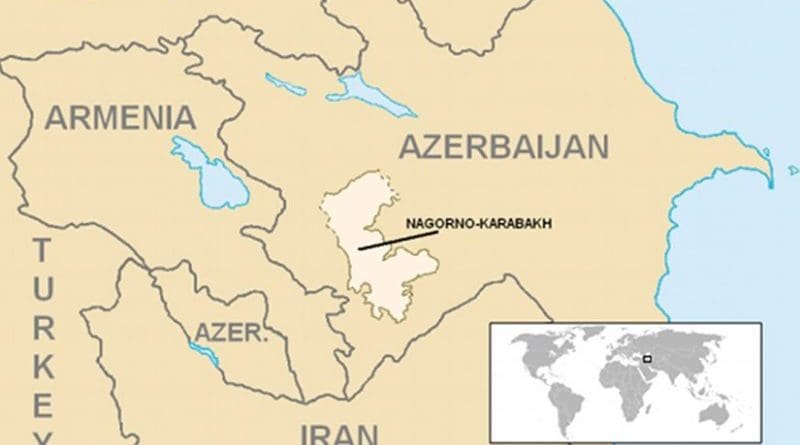European Court Rejects Armenian Claims On Nagorno-Karabakh – OpEd
In a major blow to Armenia, a small land-locked country in the South Caucasus, the European Court of Human Rights (ECHR) has ordered Yerevan to restore the economic rights of Azerbaijani refugees, the victims of Armenian aggression for more than two decades.
The court issued its historic judgment on June 16 in favor of Azerbaijani refugees in the case of Chiragov and Others v. Armenia.
The case was filed by six Azerbaijani citizens – Elkhan Chiragov, Adishirin Chiragov, Ramiz Gabrayilov, Akif Hasanof, Fakhreddin Pashayev and Qaraca Gabrayilov – against Armenia on April 6, 2005. The six had been unable to return to their homes and property in the district of Lachin in Azerbaijan from where they had been forced to flee in 1992 when Armenia seized Azerbaijani territory in a brutal war.
The ECHR identified violations of Article 1 of Protocol (protection of property), Article 8 (right to respect for private and family life) and Article 13 (right to an effective remedy) and ordered Armenia to restore the claimants’ property rights and pay compensation.
The ECHR was set up by the Council of Europe Member States in 1959 to deal with alleged violations of the 1950 European Convention on Human Rights. The well-respected court in Europe is based in Strasbourg, France.
Since 1992, several hundred thousand Azerbaijanis have been living as internally displaced persons in refugee camps in Azerbaijan. In 1992, Armenian troops with the support of former Soviet Union troops attacked Nagorno-Karabakh, an Azerbaijani enclave, and seven adjacent regions. Armenia seized in total a fifth of Azerbaijani territory and evicted Azerbaijani people from their land and homes. Until this day, Armenia continues to occupy Azerbaijani territory illegally despite international condemnation.
To cover up its naked aggression and heinous war crimes, Yerevan installed a puppet regime in Nagorno-Karabakh (NKR), which declared NKR an independent country. This country remains unrecognized by any country or international organization, including Armenia. However, Armenian troops and officials fully control NKR and all the so-called officials and citizens of this unrecognized state travel on Armenian passports.
The court out rightly dismissed Armenia’s objections that it did not have effective control over the territory of Nagorno-Karabakh and the surrounding territories and thus lacked jurisdiction.
“In conclusion, Armenia and NKR were highly integrated in virtually all important matters and NKR and its administration survived by virtue of the military, political, financial and other support given to it by Armenia. Armenia thus exercised effective control over Nagorno-Karabakh and the surrounding territories,” the court said.
For the first time, an international court has put paid to Armenia’s falsification of the reality of NKR.
“The court confirmed that Armenia exercised effective control over Nagorno-Karabakh and the surrounding territories and thus had jurisdiction over the district of Lachin,” the ECHR said in a press release.
“The court considered that there was no justification for denying the applicants access to their property without providing them with compensation.”
The ECHR will decide on how the Azerbaijani refugees are to be compensated at a later date.
There are currently, the court said, more than one thousand individual applications pending before the court, lodged by persons displaced during the conflict over Nagorno-Karabakh.
The judgment was widely welcomed all over the world. Azerbaijan, Turkey and several other countries praised the court’s decision.
Indonesia’s National Commission on Human Rights (Komnas Ham) also lauded the ECHR’s judgment.
“We welcome the European Court of Human Rights’ decision in the case of Chiragov and Others v. Armenia. This will encourage more victims of war to seek justice,” Komnas Ham chairman Nur Kholis told the media in Jakarta.
Indonesia is home to the world’s biggest Muslim population. The two Muslim-majority countries — Indonesia and Azerbaijan — are close friends and work together in international fora such as the UN, the Organization of Islamic Cooperation, the Non-Aligned Movement and others.
Nur Kholis said that Komnas Ham was ready to extend its full support to Azerbaijan and its citizens in seeking justice.
“We will support Azerbaijani victims of Armenian aggression at international fora. We call upon the international community to put pressure on Armenia to ensure justice for the victims,” he said.
Responding to the court’s decision, Azerbaijan immediately demanded that Armenia withdraw its troops from Azerbaijani territory.
“Consequently, Armenia is under the obligation, in the first place, to put an end to the occupation of the territories of Azerbaijan and to withdraw immediately, completely and unconditionally its armed forces from these territories,” the Azerbaijani Ministry of Foreign Affairs said in a statement.
Baku also called upon the international community to put pressure on Armenia to implement UN resolutions regarding Nagorno-Karabakh.
“It is therefore critical that the international community insist on the implementation of United Nations Security Council Resolutions 822 (1993), 853 (1993), 874 (1993) and 884 (1993) demanding the withdrawal of the Armenian occupying forces from the occupied territories of Azerbaijan,” the statement said.
Oil-rich Azerbaijan is much bigger, richer and stronger than Armenia. Baku wants to solve the Nagorno-Karabakh conundrum through peaceful negotiations, but bellicose Armenia, which is heavily dependent on Russia, does not want to withdraw its troops from the occupied territories of Azerbaijan. As a solution, Baku had already offered greater autonomy to Nagorno-Karabakh if Armenia agrees to withdraw from Azerbaijani territories.
Almost one million Azerbaijanis have been living as internally displaced people for more than two decades. The international community must put pressure on Armenia to implement the UN Security Council Resolutions on the Nagorno-Karabakh issue.

